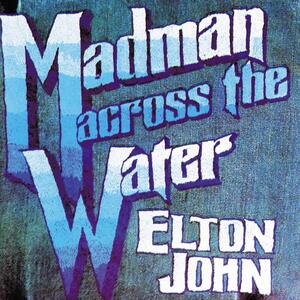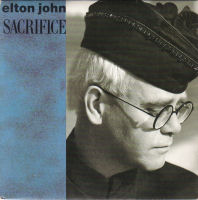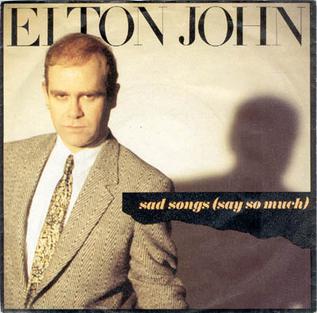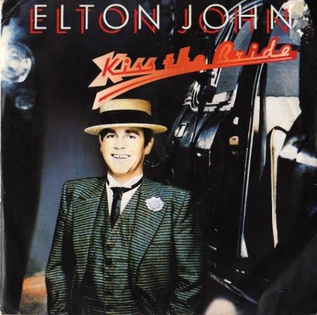
Madman Across the Water is the fourth studio album by English musician Elton John, released on 5 November 1971 by DJM and Uni Records. The album was his third album to be released in 1971, at which point John had been rising to prominence as a popular music artist. John's first progressive rock album, Madman Across the Water contains nine tracks, each composed and performed by John and with lyrics written by songwriting partner Bernie Taupin. Yes keyboardist Rick Wakeman plays Hammond organ on two songs.

Honky Château is the fifth studio album by English musician Elton John. It was released on 19 May 1972, and was titled after the 18th century French chateau where it was recorded, Château d'Hérouville. The album reached number one on the US Billboard 200, the first of John's seven consecutive US number one albums.

"Tiny Dancer" is a song written by English musician and composer Elton John and lyricist Bernie Taupin, and performed by John. It was originally released on John's 1971 album Madman Across the Water as its opening track, and was later produced and released as a single in 1972.

"Daniel" is a song written by English musician Elton John and his long-time songwriting partner Bernie Taupin, and performed by John. It was first released on John's 1973 album Don't Shoot Me I'm Only the Piano Player as its opening track. The original single release was also notable for a re-recorded version of "Skyline Pigeon" on its B-side, which went on to be a popular track in its own right.
"Candle in the Wind" is a threnody style ballad written by English musician Elton John and songwriter Bernie Taupin, and performed by John. It was originally written in 1973, in honour of Marilyn Monroe, who had died 11 years earlier.

Too Low for Zero is the seventeenth studio album by English musician Elton John, released in 1983. The album marked a comeback for John, whose previous four albums had failed to yield many enduring international hit singles, and had disappointing sales compared to his string of hit records released during the first half of the 1970s.

Breaking Hearts is the eighteenth studio album by English musician Elton John, released in 1984. It features the quartet of John, Davey Johnstone, Dee Murray and Nigel Olsson. There were four top-40 singles from the album: "Sad Songs ", "Who Wears These Shoes", "In Neon", and the UK No. 5 hit "Passengers".

"Crocodile Rock" is a song written by Elton John and Bernie Taupin, and recorded in summer 1972 at the Château d'Hérouville studio in France, where John and his team had previously recorded the Honky Château album. It was released on 27 October 1972 in the UK and 20 November 1972 in the U.S., as a pre-release single from his forthcoming 1973 album Don't Shoot Me I'm Only the Piano Player, and became his first U.S. number-one single, reaching the top spot on 3 February 1973, and staying there for three consecutive weeks. In the U.S., it was certified Gold on 5 February 1973 and Platinum on 13 September 1995 by the Recording Industry Association of America (RIAA).

"Someone Saved My Life Tonight" is a song with music by British musician Elton John and lyrics by Bernie Taupin, from John's 1975 album Captain Fantastic and the Brown Dirt Cowboy. It was released as a single on 20 June 1975, the only single released from the album. Like the rest of the album, the song is autobiographical, and addresses an attempted suicide by John.

"Sacrifice" is a song by British musician Elton John, written by John and Bernie Taupin, from John's 22nd studio album, Sleeping with the Past (1989). It was first released in October 1989 as the second single from the album. It achieved success in 1990, particularly in France and the United Kingdom, becoming John's first solo chart-topper in both nations. The song describes how hard it is to stay faithful and devoted in a marriage, challenging the mantra that a successful union requires sacrifice. Due to the song's success, John has played this song in various locations in the years since it was released.

"Club at the End of the Street" is an upbeat pop rock song composed by English musician Elton John with lyrics by Bernie Taupin. It was included on John's album Sleeping with the Past in 1989 and released as its third single in 1990. The song describes a night on the town between two lovers at an undisclosed nightclub. In 2013, John stated on Rolling Stone that this song was one of his favourites. The song featured an animated music video. He performed it three times live during the One Night Only concerts in 2000.

"Nikita" is a song by English musician Elton John from his 19th studio album, Ice on Fire (1985). It was released as the album's lead single on 4 October 1985, charting at number three on the UK Singles Chart, peaking at number seven in the United States, and reaching the top 10 worldwide, topping the charts of eight countries. The song features George Michael on backing vocals and Nik Kershaw on guitar.

"I Guess That's Why They Call It the Blues" is a song by English musician Elton John, with music by John and Davey Johnstone and lyrics by Bernie Taupin, released as the first single from John's 17th studio album Too Low for Zero. It was the first single since 1975's "Someone Saved My Life Tonight" to feature the classic lineup of the Elton John Band.

"Sad Songs (Say So Much)" is the closing track on English musician Elton John's 18th studio album Breaking Hearts, written by John and Bernie Taupin, released in 1984 as the lead single of the album. It reached No. 7 on the UK chart and No. 5 on the US Billboard Hot 100 chart. The song reached the Top 10 of many countries except in Germany and Italy where it reached the Top 20. The single version of this song appeared on the 1990 box set To Be Continued... and various versions of the 2007 compilation Rocket Man: The Definitive Hits.

"This Train Don't Stop There Anymore" is the final track on Elton John's 2001 album Songs from the West Coast. Written by John and Bernie Taupin, the song's lyrics detail John's fame being over and his coming to terms with getting older but still keep touring and giving great performances around the world. It was released as the second single from the album and reached No. 24 in the UK Singles chart and was a Top 10 Adult Contemporary chart hit in the US. The song was less successful in the Netherlands, reaching No. 83.

"Healing Hands" is a song by English musician Elton John, written by John and Bernie Taupin, from John's 1989 album, Sleeping with the Past. The single was released in August 1989 and was a top-20 hit in the United States. A reissued version became the singer's first solo number-one single in the United Kingdom in June 1990.
"Crazy Water" is a song by English musician Elton John with lyrics written by Bernie Taupin. It is the seventh track on his 1976 album, Blue Moves. It was released as a single in the UK in February 1977. The single reached No. 27 in the UK singles charts.

"Kiss the Bride" is a song by English musician Elton John, from his 17th studio album, Too Low for Zero, written by John and Bernie Taupin. Released as the album's third single, the upbeat song was a top 40 hit in many countries. It reached No. 20 on the UK Singles Chart, No. 25 on the US Billboard Hot 100 chart, No. 25 in Australia, No. 37 in Canada, No. 17 in Ireland, and No. 32 in New Zealand. In Germany, the song peaked at No. 58.
"We All Fall in Love Sometimes" is the ninth track on Elton John's album Captain Fantastic and the Brown Dirt Cowboy, written by John (music) and Bernie Taupin (lyrics), and released in 1975.

"Heartache All Over the World" is an upbeat song by English musician Elton John from his 20th studio album, Leather Jackets (1986). Written by John and Bernie Taupin, it was released as the album's lead single in September 1986, charting at number 45 in the UK Singles Chart and at number 55 on the US Billboard Hot 100, and reaching the top 10 in Australia, where it peaked at number 7. The song talks about not being able to date for a night.














